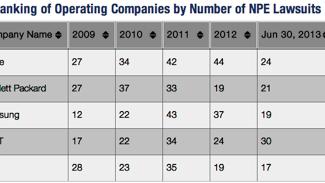PatentTrolling
Latest

Apple is now the undisputed No. 1 victim of all patent trolling
When you're one of the world's most valuable companies, it's not hard to find people hoping to lift a few bucks from your coffers by whatever means they can. And when it comes to patent trolling, the top target of patent trolls is none other than Apple, according to international law firm Winston & Strawn. A patent troll is an individual or company that buys patents for the sole purpose of using them to sue companies, while never using those patents for their own products or services. Apple has been attacked over patent claims ranging from how the iPhone's screen rotates to how iOS processes in-app payments, and while the company's legal team is able to squash the majority of these lawsuits, several have been successful. Patent trolls, also known as nonpracticing entities, are going after the largest companies because that's where the money is -- with the most popular products and the biggest markets, Steven D. Atlee, a partner with Winston & Strawn, tells TUAW. "A patent litigation can cripple a smaller company, and even some of the larger companies are spending a good chunk of their revenues defending against such claims," he said. And the money Apple is spending to defend against such litigation is climbing, as the number of lawsuits levied against the company by nonpracticing entities has skyrocketed from 18 in 2008 to 44 in 2012, according to data from Patent Freedom. But it's not all doom and gloom, and legislators are becoming aware that patent trolls are working solely in the interest of their own pocketbooks, rather than to actually protect the patent in question. "There are some changes in the courts and in the legislature which are making patent suits easier to defend," Atlee said. "It is no longer a given that the plaintiff will be able to get an injunction or court order barring the sale or importation of the accused product. Also, legislators are looking at rules which will make bringing patent cases more expensive and risky for the plaintiff." [via TechHive]
